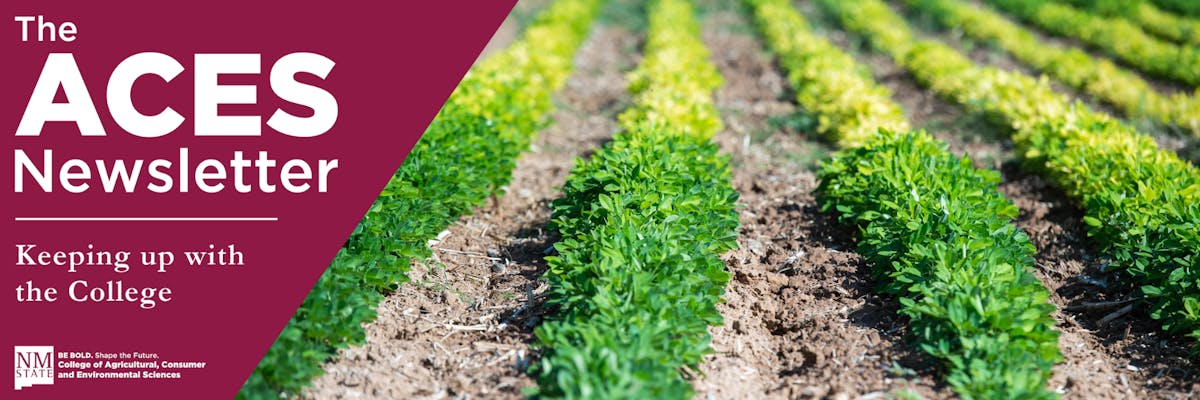 |
A MESSAGE FROM OUR DEAN Dear Friends of the College of ACES and Alumni, In this issue, we celebrate the remarkable achievements of our students and the collaborative efforts taking place across the NMSU system beyond the College of ACES. These successes directly contribute to our students’ futures, with many outcomes being applied through experiential learning and research. Research initiatives within the college, supported by organizations such as the Center of Excellence in Sustainable Food and Agricultural Systems (CESFAS), continue to drive innovation and impact. We also take this opportunity to express our gratitude to our legislators for their ongoing support to the College of ACES, NMSU, and the various organizations that make these advancements possible. The positive influence of our work is evident in the economic growth and rural development of New Mexico, with numerous examples showcasing its impact. Additionally, we take great pride in the outstanding research conducted within the college, spanning from value-added agriculture to the critical issue of water management. We encourage you to explore this newsletter, and we appreciate your continued support. GO AGGIES! |
A MESSAGE FROM OUR DEAN Dear Friends of the College of ACES and Alumni, In this issue, we celebrate the remarkable achievements of our students and the collaborative efforts taking place across the NMSU system beyond the College of ACES. These successes directly contribute to our students’ futures, with many outcomes being applied through experiential learning and research. Research initiatives within the college, supported by organizations such as the Center of Excellence in Sustainable Food and Agricultural Systems (CESFAS), continue to drive innovation and impact. We also take this opportunity to express our gratitude to our legislators for their ongoing support to the College of ACES, NMSU, and the various organizations that make these advancements possible. The positive influence of our work is evident in the economic growth and rural development of New Mexico, with numerous examples showcasing its impact. Additionally, we take great pride in the outstanding research conducted within the college, spanning from value-added agriculture to the critical issue of water management. We encourage you to explore this newsletter, and we appreciate your continued support. GO AGGIES! |
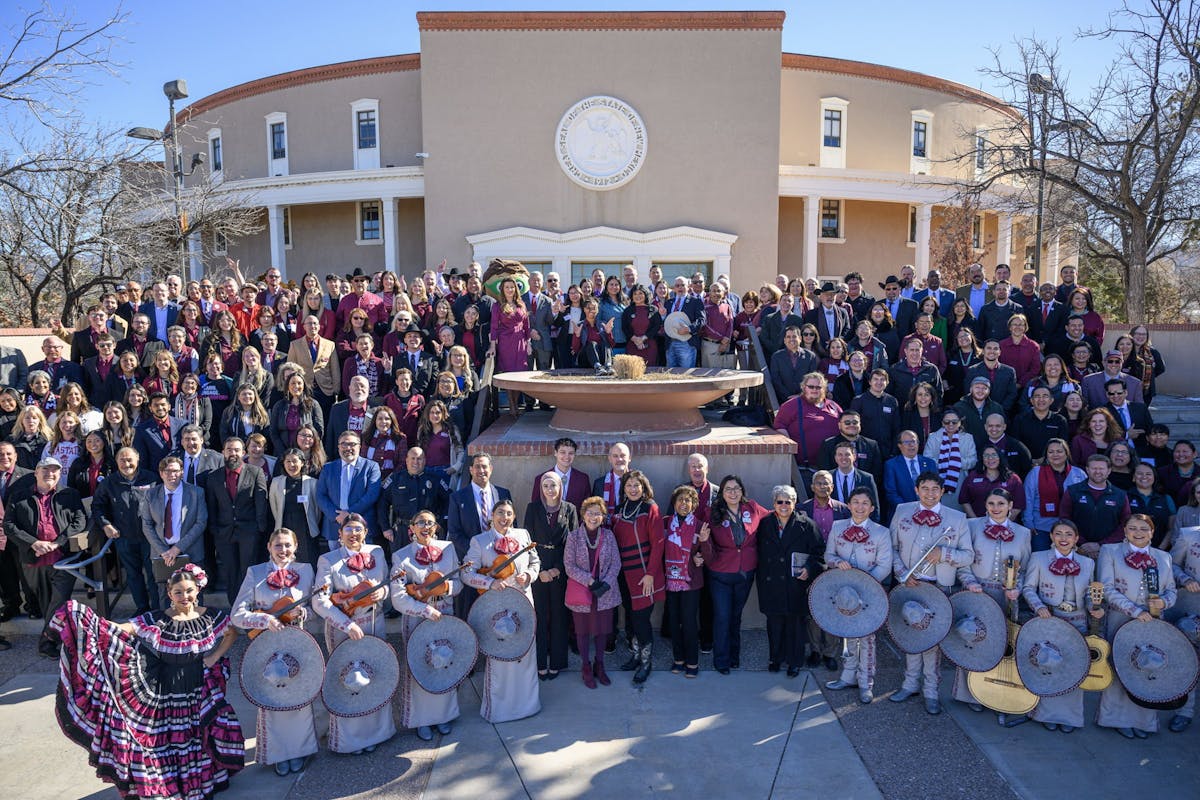 |
New Mexico State University Day at the Legislature on January 31, 2025 in Santa Fe, New Mexico. (Photo by Sam Wasson for New Mexico State University) |
New Mexico State University Day at the Legislature on January 31, 2025 in Santa Fe, New Mexico. (Photo by Sam Wasson for New Mexico State University) |
Journey Sheehan- State 4-H Ambassador, Jaleh Mosher - State 4-H Vice President, Rolando A. Flores Galarza – ACES Dean & Chief Administrative Officer, Jon Boren – Associate Dean and Director of Cooperative Extension Service, Kyle Wood - State 4-H Ambassador, Faith Carter - State 4-H Reporter and Lacey Knight - State 4-H Ambassador. |
Journey Sheehan- State 4-H Ambassador, Jaleh Mosher - State 4-H Vice President, Rolando A. Flores Galarza – ACES Dean & Chief Administrative Officer, Jon Boren – Associate Dean and Director of Cooperative Extension Service, Kyle Wood - State 4-H Ambassador, Faith Carter - State 4-H Reporter and Lacey Knight - State 4-H Ambassador. |
Rolando A. Flores Galarza Dean & Chief Administrative Officer |
Rolando A. Flores Galarza Dean & Chief Administrative Officer |
AGRICULTURAL EXPERIMENT STATION |
AGRICULTURAL EXPERIMENT STATION |
|
|
Sustainable Agricultural Science Center at Alcalde Multistate Research Late last year the Sustainable Agricultural Science Center at Alcalde hosted the 2024 multistate NC140 Fruit Tree Rootstock Group annual meeting in Santa Fe, NM. With 32 attendees from 19 states and one Canadian province, it was a very successful meeting to discuss the project results from the prior year and plan for what is next. Multistate projects are funded through USDA-NIFA and provide opportunities for researchers to collaborate with other land-grant scientists around the country. Jujube research has been ongoing at the SASC in Alcalde for over 10 years. The goal is to identify a jujube cultivar that will provide economic value to commercial growers and small-scale farmers who might be interested in a specialty crop. The meeting included a product tasting event, which offered fresh and dried jujubes, along with other options for tasting. This was a great opportunity to promote jujubes to pomologists nationwide. For more information, contact Communications and Reporting Director Claire Montoya at ccortner@nmsu.edu. |
Sustainable Agricultural Science Center at Alcalde Multistate Research Late last year the Sustainable Agricultural Science Center at Alcalde hosted the 2024 multistate NC140 Fruit Tree Rootstock Group annual meeting in Santa Fe, NM. With 32 attendees from 19 states and one Canadian province, it was a very successful meeting to discuss the project results from the prior year and plan for what is next. Multistate projects are funded through USDA-NIFA and provide opportunities for researchers to collaborate with other land-grant scientists around the country. Jujube research has been ongoing at the SASC in Alcalde for over 10 years. The goal is to identify a jujube cultivar that will provide economic value to commercial growers and small-scale farmers who might be interested in a specialty crop. The meeting included a product tasting event, which offered fresh and dried jujubes, along with other options for tasting. This was a great opportunity to promote jujubes to pomologists nationwide. For more information, contact Communications and Reporting Director Claire Montoya at ccortner@nmsu.edu. |
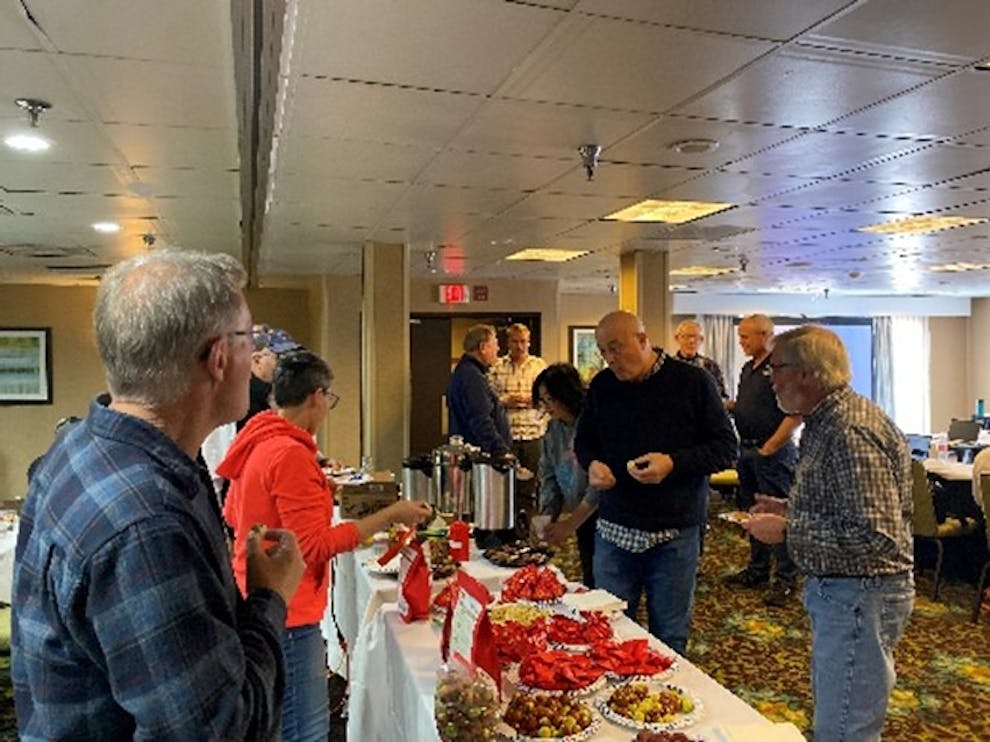 |
|
|
EXTENSION FAMILY & CONSUMER SCIENCES |
EXTENSION FAMILY & CONSUMER SCIENCES |
Extension Specialist Invited to Present at Head Start In-Service On February 17, Dr. Karim Martinez, Extension Family Life and Child Development specialist, presented at the Youth Development Incorporated (YDI) Head Start Spring In-Service in Albuquerque, NM. The theme for the in-service was Embrace Wellness, Embrace Life! Dr. Martinez’s presentation on Stress and Resilience was provided in conjunction with a presentation on Journaling by Dr. Jeannie Baca, YDI Quality Performance Office. The Stress and Resilience presentation included information and activities to learn how stress affects the brain and body, techniques for managing stress, and strategies for growing resilience. During the Journaling presentation, participants learned about the benefits of journaling for improving emotional and mental health and practiced journaling using a variety of writing prompts. Dr. Martinez and Dr. Baca provided their session five times, reaching a total of 240 Head Start teachers, teacher assistants, kitchen staff, program managers and administrators from centers in Bernalillo, Taos and Rio Arriba counties. Evaluations collected from participants showed 99% agreed or strongly agreed that the session content was informative and met their needs. Examples of information participants plan to apply in their work environments include “be mindful, take a deep breath, challenge my mindset and practice self-care”, “take time to journal my thoughts, feelings, and daily activities”, and “write down my goals, reflect on my gratitude.” For more information contact Karim Martinez (karmarti@nmsu.edu) |
Extension Specialist Invited to Present at Head Start In-Service On February 17, Dr. Karim Martinez, Extension Family Life and Child Development specialist, presented at the Youth Development Incorporated (YDI) Head Start Spring In-Service in Albuquerque, NM. The theme for the in-service was Embrace Wellness, Embrace Life! Dr. Martinez’s presentation on Stress and Resilience was provided in conjunction with a presentation on Journaling by Dr. Jeannie Baca, YDI Quality Performance Office. The Stress and Resilience presentation included information and activities to learn how stress affects the brain and body, techniques for managing stress, and strategies for growing resilience. During the Journaling presentation, participants learned about the benefits of journaling for improving emotional and mental health and practiced journaling using a variety of writing prompts. Dr. Martinez and Dr. Baca provided their session five times, reaching a total of 240 Head Start teachers, teacher assistants, kitchen staff, program managers and administrators from centers in Bernalillo, Taos and Rio Arriba counties. Evaluations collected from participants showed 99% agreed or strongly agreed that the session content was informative and met their needs. Examples of information participants plan to apply in their work environments include “be mindful, take a deep breath, challenge my mindset and practice self-care”, “take time to journal my thoughts, feelings, and daily activities”, and “write down my goals, reflect on my gratitude.” For more information contact Karim Martinez (karmarti@nmsu.edu) |
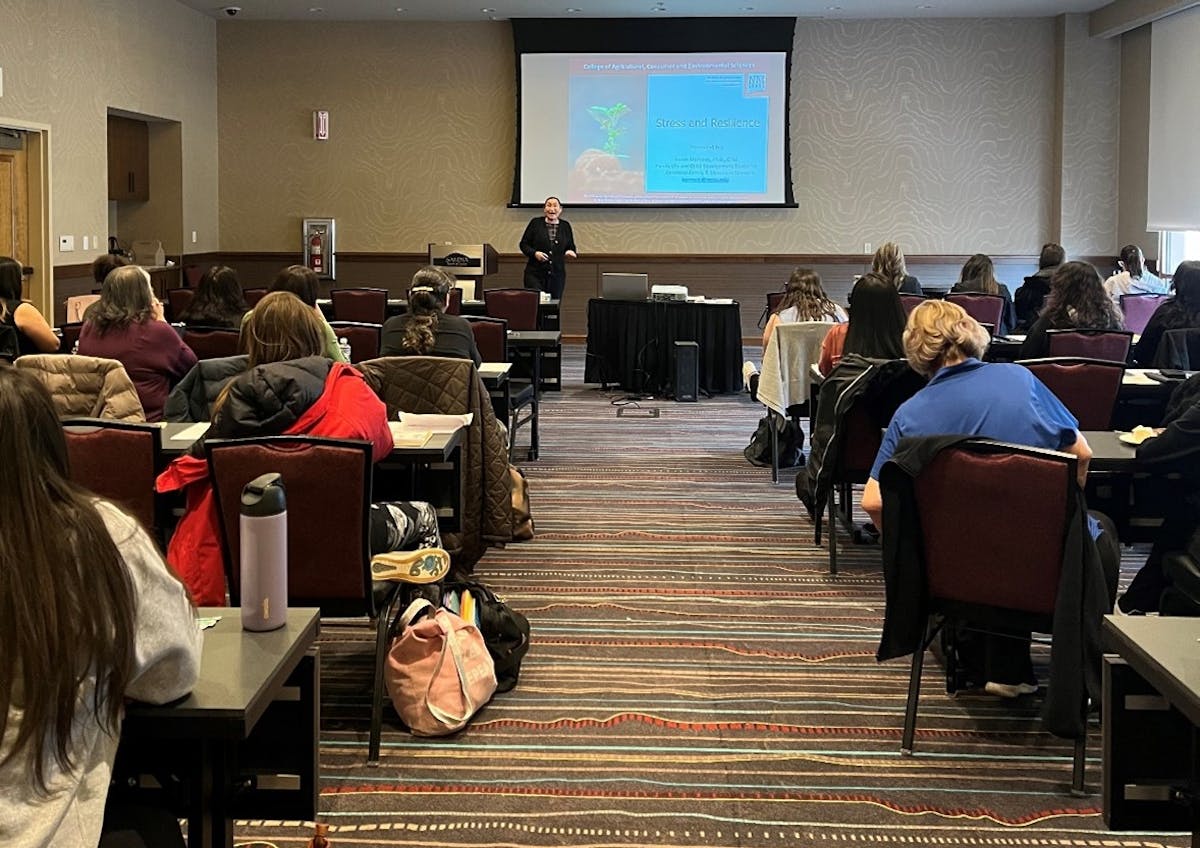 |
|
|
CENTER OF EXCELLENCE IN SUSTAINABLE FOOD & AGRICULTURAL SYSTEMS |
CENTER OF EXCELLENCE IN SUSTAINABLE FOOD & AGRICULTURAL SYSTEMS |
NMSU Students Shine in CEAAg World with Container Farm Prototype New Mexico State University students have been recognized for their innovative container farm prototype project in CEAAg World, a top publication in the controlled environment agriculture industry. Undergraduate students with the College of Engineering Capstone program have been designing the system, while Doña Ana Community College students, under the guidance of Kevin Gall from the Architecture and Construction Technologies program, handle the construction. Our students have had the opportunity to work hand-in-hand with our industry partner, Reliable Controls Inc, to develop a custom electronic control system for this and similar systems. With completion expected in May, the container farm prototype is anticipated to be showcased at the New Mexico Farm and Ranch Museum, serving as both a living exhibit for the public and a research platform for further NMSU studies in controlled environment agriculture. The project is funded and overseen by ACES Center of Excellence in Sustainable Food and Agricultural Systems faculty members Alex Wilson and Dr. Sergio Martinez-Monteagudo. This project exemplifies the collaborative spirit and innovative approach of CESFAS-sponsored initiatives, combining all aspects of the land grant mission. For more information about this project and other CESFAS initiatives, please reach out to Dr. Omar Holguin, the Director of CESFAS. Story Link: https://www.ceagworld.com/vertical-farming/nmsu-exploring-the-potential-of-container-farms-out-west/ Contact: cesfas@nmsu.edu |
NMSU Students Shine in CEAAg World with Container Farm Prototype New Mexico State University students have been recognized for their innovative container farm prototype project in CEAAg World, a top publication in the controlled environment agriculture industry. Undergraduate students with the College of Engineering Capstone program have been designing the system, while Doña Ana Community College students, under the guidance of Kevin Gall from the Architecture and Construction Technologies program, handle the construction. Our students have had the opportunity to work hand-in-hand with our industry partner, Reliable Controls Inc, to develop a custom electronic control system for this and similar systems. With completion expected in May, the container farm prototype is anticipated to be showcased at the New Mexico Farm and Ranch Museum, serving as both a living exhibit for the public and a research platform for further NMSU studies in controlled environment agriculture. The project is funded and overseen by ACES Center of Excellence in Sustainable Food and Agricultural Systems faculty members Alex Wilson and Dr. Sergio Martinez-Monteagudo. This project exemplifies the collaborative spirit and innovative approach of CESFAS-sponsored initiatives, combining all aspects of the land grant mission. For more information about this project and other CESFAS initiatives, please reach out to Dr. Omar Holguin, the Director of CESFAS. Story Link: https://www.ceagworld.com/vertical-farming/nmsu-exploring-the-potential-of-container-farms-out-west/ Contact: cesfas@nmsu.edu |
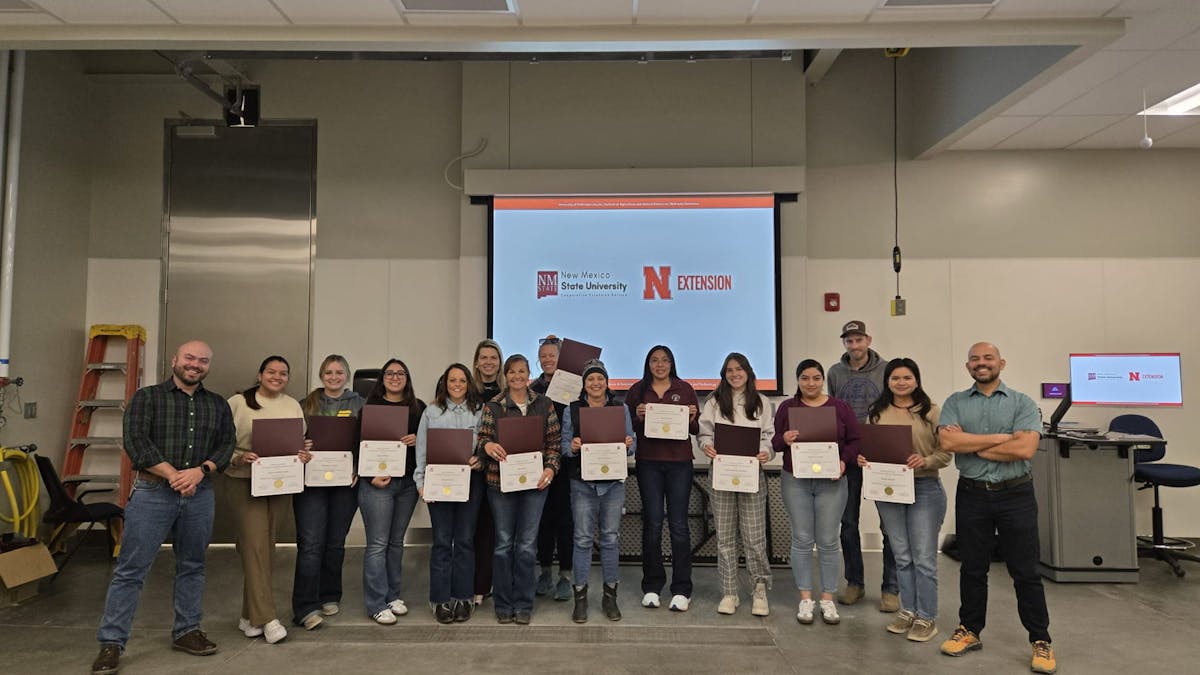 |
Dr. Luis Sabillon-Galeas and Dr. Francine Mezzomo Giotto, in collaboration with Dr. Byron Chaves from Nebraska Extension, hosted the Principles of HACCP for Meat and Poultry Processors certification course on February 11 and 12 in Las Cruces. The Hazard Analysis and Critical Control Points (HACCP) system is the universal language of food safety management. This course provided participants with foundational knowledge and practical tools to develop and implement HACCP plans applicable to various industries and commodities. The course content followed the approved curriculum of the “International HACCP Alliance” and included a combination of lectures and hands-on activities. A total of 12 participants attended the event, including industry professionals from Stampede Culinary Partners, Inc. and USA Beef Packing, four county agents representing Bernalillo, Santa Fe, Sierra, and Eddy counties, as well as graduate students. As a result of the training, the participating county agents are now certified to assist their respective counties and regions in food safety and HACCP-related matters. Sierra Chopito, a Master’s student in Food Science & Technology, expresses her gratitude to CESFAS for funding her HACCP training and investing in her professional development. "This training has significantly enhanced my skills in food safety and sanitation, expanding my knowledge and preparing me for my future career as a Product Developer in the food industry. I am confident that this experience has deepened my understanding of HACCP principles, particularly in meat and poultry processing, as well as food laws and governmental regulations related to food safety. I am truly grateful for CESFAS’s support, which has made a meaningful impact on my professional growth and aspirations." A special thank you to Nebraska Extension for their ongoing collaboration, and to NMSU-CES and CESFAS for their financial support in making this training possible. To learn more, contact Assistant Professors Dr. Luis Sabillón-Galeas at lsabillo@nmsu.edu or Dr. Francine Mezzomo Giotto at fgiotto@nmsu.edu. |
Dr. Luis Sabillon-Galeas and Dr. Francine Mezzomo Giotto, in collaboration with Dr. Byron Chaves from Nebraska Extension, hosted the Principles of HACCP for Meat and Poultry Processors certification course on February 11 and 12 in Las Cruces. The Hazard Analysis and Critical Control Points (HACCP) system is the universal language of food safety management. This course provided participants with foundational knowledge and practical tools to develop and implement HACCP plans applicable to various industries and commodities. The course content followed the approved curriculum of the “International HACCP Alliance” and included a combination of lectures and hands-on activities. A total of 12 participants attended the event, including industry professionals from Stampede Culinary Partners, Inc. and USA Beef Packing, four county agents representing Bernalillo, Santa Fe, Sierra, and Eddy counties, as well as graduate students. As a result of the training, the participating county agents are now certified to assist their respective counties and regions in food safety and HACCP-related matters. Sierra Chopito, a Master’s student in Food Science & Technology, expresses her gratitude to CESFAS for funding her HACCP training and investing in her professional development. "This training has significantly enhanced my skills in food safety and sanitation, expanding my knowledge and preparing me for my future career as a Product Developer in the food industry. I am confident that this experience has deepened my understanding of HACCP principles, particularly in meat and poultry processing, as well as food laws and governmental regulations related to food safety. I am truly grateful for CESFAS’s support, which has made a meaningful impact on my professional growth and aspirations." A special thank you to Nebraska Extension for their ongoing collaboration, and to NMSU-CES and CESFAS for their financial support in making this training possible. To learn more, contact Assistant Professors Dr. Luis Sabillón-Galeas at lsabillo@nmsu.edu or Dr. Francine Mezzomo Giotto at fgiotto@nmsu.edu. |
|
|
Researchers create ice cream to honor NMSU’s new president Everyone, of course, has their favorite flavor of ice cream. But what about the newly christened leader of New Mexico’s 137-year-old land-grant institution? Look no further than the caramelized pecan- and biscotti concoction developed for New Mexico State University President Valerio Ferme by researchers from NMSU’s Center of Excellence in Sustainable Foods and Agricultural Systems, or CESFAS. The creamy vanilla ice cream pays homage to Ferme’s Italian heritage and new ties to New Mexico, a top pecan-producing state. It’s called The Ferme Paradox and made its public debut earlier this month to enthusiastic praise from Ferme after weeks of research and development by a team headed by Sergio Martinez-Monteagudo. “This ice cream is wonderful, of course – but it’s much more than that,” Ferme said. “It’s a brilliant way to showcase the incredible consumer-driven food science research being done in our College of Agricultural, Consumer and Environmental Sciences and to make hands-on learning fun and engaging for our graduate students.” Martinez-Monteagudo, an associate professor of food bioprocessing, conducts research to improve the quality of ice cream and reduce waste in its production. His projects have received funding from more than a dozen companies, including Blue Bell Creameries and Blue Bunny Ice Cream. He joined NMSU in 2020 and serves dual faculty appointments in the College of ACES and College of Engineering. Last fall, after the NMSU Board of Regents selected Ferme to lead NMSU, Martinez-Monteagudo pitched the ice cream during a meeting to gather ideas to raise awareness of CESFAS and the Food Science and Technology program. CESFAS, a state-funded research institute, seeks to advance sustainable agriculture through interdisciplinary research. “It was just an informal idea, and we laughed about it,” Martinez-Monteagudo said. “But we started taking it seriously after the director of the center, Dr. Omar Holguín, told us, ‘OK, let’s do this.’” With a team of six graduate students from the Food Science and Technology and Chemical Engineering programs, Martinez-Monteagudo began formulating the ice cream. The team worked in the ACES food science dairy lab over winter break and tested eight flavors before two top contenders emerged: the pecan-and-biscotti option that eventually became The Ferme Paradox and a cookies-and-cream variation called Aggies ’n Cream. “We all preferred the ice cream with pecans and biscotti and started playing around with the details of the final formulation until the week of the event,” he said. Once the recipe met Martinez-Monteagudo’s standards, his students prepared nearly 25 liters of the ice cream for the Feb. 6 unveiling and tasting event in Gerald Thomas Hall. He describes The Ferme Paradox as a premium ice cream with a fat content between 10% and 12%, which accounts for its extra creamy texture. More than four dozen Aggies sampled the ice cream during the event, including its namesake. The feedback was overwhelmingly positive, which came at no surprise to Martinez-Monteagudo. “If you work in ice cream, you know that it’s really, really hard to make a bad product,” he said. “So, I knew people would like it. But I didn’t expect to run out of ice cream. I was expecting some leftovers to take home, but there was nothing left.” So, what does the future hold for NMSU’s first presidential ice cream? Martinez-Monteagudo and CESFAS are working to bring it to market to sell it on campus. But that may take several weeks, he cautioned. “Right now, people are excited and interested, and we have good momentum,” he said. “We’re working to get everything in order over the next month or so.” In the meantime, he believes the ice cream served its original purpose of bringing awareness to CESFAS and the Food Science and Technology program. “By making this ice cream, we’re increasing our visibility,” he said. “If there are external companies or even taxpayers who want to start an ice cream business, CESFAS can help. We can help develop the formulation, we can help analyze the products, and we can help with consulting.” |
Researchers create ice cream to honor NMSU’s new president Everyone, of course, has their favorite flavor of ice cream. But what about the newly christened leader of New Mexico’s 137-year-old land-grant institution? Look no further than the caramelized pecan- and biscotti concoction developed for New Mexico State University President Valerio Ferme by researchers from NMSU’s Center of Excellence in Sustainable Foods and Agricultural Systems, or CESFAS. The creamy vanilla ice cream pays homage to Ferme’s Italian heritage and new ties to New Mexico, a top pecan-producing state. It’s called The Ferme Paradox and made its public debut earlier this month to enthusiastic praise from Ferme after weeks of research and development by a team headed by Sergio Martinez-Monteagudo. “This ice cream is wonderful, of course – but it’s much more than that,” Ferme said. “It’s a brilliant way to showcase the incredible consumer-driven food science research being done in our College of Agricultural, Consumer and Environmental Sciences and to make hands-on learning fun and engaging for our graduate students.” Martinez-Monteagudo, an associate professor of food bioprocessing, conducts research to improve the quality of ice cream and reduce waste in its production. His projects have received funding from more than a dozen companies, including Blue Bell Creameries and Blue Bunny Ice Cream. He joined NMSU in 2020 and serves dual faculty appointments in the College of ACES and College of Engineering. Last fall, after the NMSU Board of Regents selected Ferme to lead NMSU, Martinez-Monteagudo pitched the ice cream during a meeting to gather ideas to raise awareness of CESFAS and the Food Science and Technology program. CESFAS, a state-funded research institute, seeks to advance sustainable agriculture through interdisciplinary research. “It was just an informal idea, and we laughed about it,” Martinez-Monteagudo said. “But we started taking it seriously after the director of the center, Dr. Omar Holguín, told us, ‘OK, let’s do this.’” With a team of six graduate students from the Food Science and Technology and Chemical Engineering programs, Martinez-Monteagudo began formulating the ice cream. The team worked in the ACES food science dairy lab over winter break and tested eight flavors before two top contenders emerged: the pecan-and-biscotti option that eventually became The Ferme Paradox and a cookies-and-cream variation called Aggies ’n Cream. “We all preferred the ice cream with pecans and biscotti and started playing around with the details of the final formulation until the week of the event,” he said. Once the recipe met Martinez-Monteagudo’s standards, his students prepared nearly 25 liters of the ice cream for the Feb. 6 unveiling and tasting event in Gerald Thomas Hall. He describes The Ferme Paradox as a premium ice cream with a fat content between 10% and 12%, which accounts for its extra creamy texture. More than four dozen Aggies sampled the ice cream during the event, including its namesake. The feedback was overwhelmingly positive, which came at no surprise to Martinez-Monteagudo. “If you work in ice cream, you know that it’s really, really hard to make a bad product,” he said. “So, I knew people would like it. But I didn’t expect to run out of ice cream. I was expecting some leftovers to take home, but there was nothing left.” So, what does the future hold for NMSU’s first presidential ice cream? Martinez-Monteagudo and CESFAS are working to bring it to market to sell it on campus. But that may take several weeks, he cautioned. “Right now, people are excited and interested, and we have good momentum,” he said. “We’re working to get everything in order over the next month or so.” In the meantime, he believes the ice cream served its original purpose of bringing awareness to CESFAS and the Food Science and Technology program. “By making this ice cream, we’re increasing our visibility,” he said. “If there are external companies or even taxpayers who want to start an ice cream business, CESFAS can help. We can help develop the formulation, we can help analyze the products, and we can help with consulting.” |
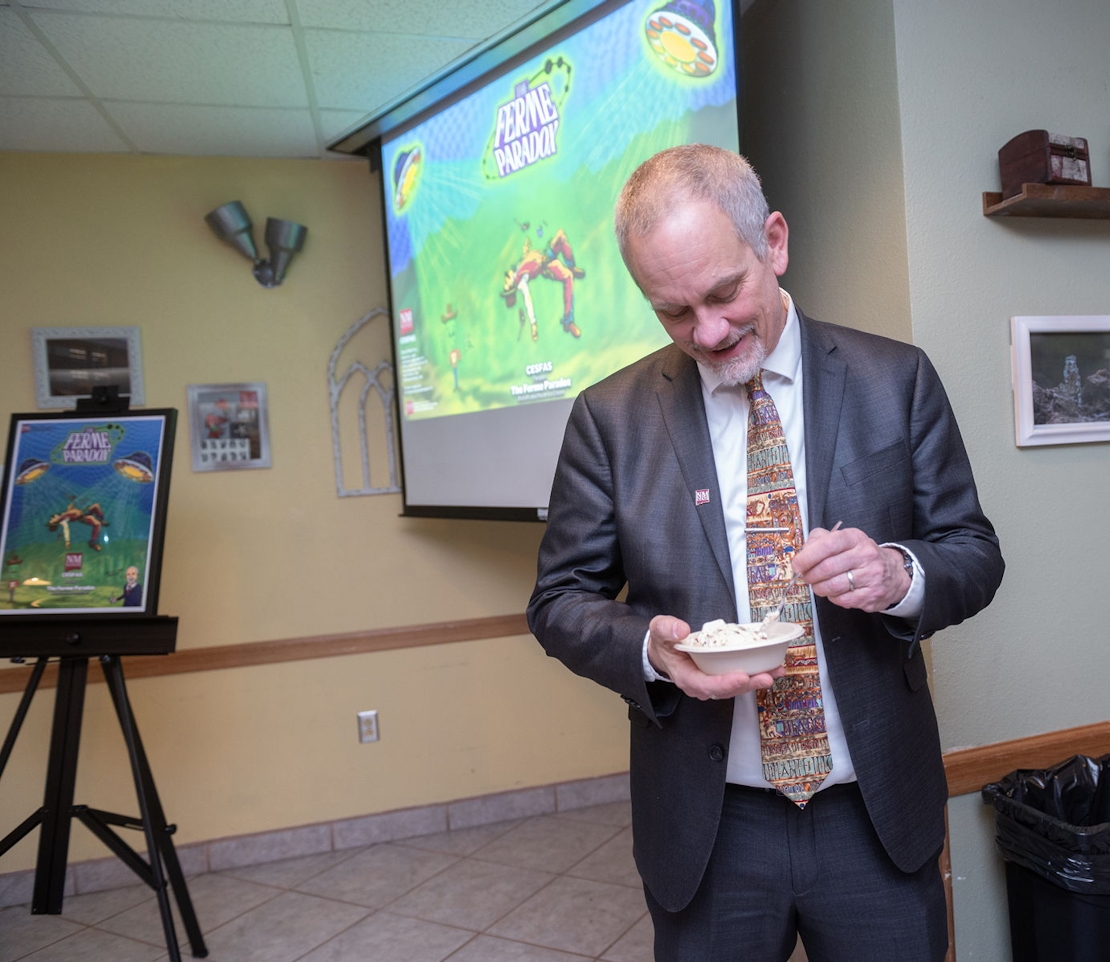 |
New Mexico State University President Valerio Ferme samples ice cream created in his honor by NMSU researchers. The vanilla ice cream contains caramelized pecans and biscotti, an homage to Ferme’s Italian heritage and his new ties to New Mexico, a top pecan-producing state. (NMSU photo by Josh Bachman) |
New Mexico State University President Valerio Ferme samples ice cream created in his honor by NMSU researchers. The vanilla ice cream contains caramelized pecans and biscotti, an homage to Ferme’s Italian heritage and his new ties to New Mexico, a top pecan-producing state. (NMSU photo by Josh Bachman) |
A talented team of NMSU students—Andrea Soler (Food Science, M.S.), Joy Agbawodike (Food Science, M.S.), Alejandro Schutte (Food Science, B.S.), Ashley Medina Cardona (Chemical Engineering, B.S.), and Jazmine Arreola (Chemical Engineering, B.S.)—has been recognized for their innovative creation, “Nuestro Corazón.” Their project has been selected as one of six finalists in the Dairy Management Inc. New Product Competition (link), standing out among dozens of entries as a potential cutting-edge dairy-based product for heart health and weight management. Over the next month, the team will refine their product through sensory evaluation and shelf-life testing. As finalists in this prestigious competition, they are required to submit a full project report by March and deliver an oral presentation to the panel of judges via Zoom in April. The top three teams will have the opportunity to attend a conference, present a poster about their product, and compete for cash awards of up to $8,000. |
A talented team of NMSU students—Andrea Soler (Food Science, M.S.), Joy Agbawodike (Food Science, M.S.), Alejandro Schutte (Food Science, B.S.), Ashley Medina Cardona (Chemical Engineering, B.S.), and Jazmine Arreola (Chemical Engineering, B.S.)—has been recognized for their innovative creation, “Nuestro Corazón.” Their project has been selected as one of six finalists in the Dairy Management Inc. New Product Competition (link), standing out among dozens of entries as a potential cutting-edge dairy-based product for heart health and weight management. Over the next month, the team will refine their product through sensory evaluation and shelf-life testing. As finalists in this prestigious competition, they are required to submit a full project report by March and deliver an oral presentation to the panel of judges via Zoom in April. The top three teams will have the opportunity to attend a conference, present a poster about their product, and compete for cash awards of up to $8,000. |
INNOVATIVE MEDIA RESEARCH & EXTENSION |
INNOVATIVE MEDIA RESEARCH & EXTENSION |
New game helps learners understand aquifer management and decision-making about water A team from NMSU ACES and the University of California Merced have created an educational strategy game that allows players to experience the impacts of water use decisions in a farming environment. Set in the fictitious Cozy River Valley, players are tasked with managing agricultural production on their farms while also meeting the water needs of the community and the environment. Players make surface water and groundwater use decisions, work with neighbors to maintain and replenish the aquifer, and provide water to wetlands and downstream users. Game design allows users to witness both the short- and long-term effects of their choices on the aquifer and puts their decisions in the context of challenges faced daily by farmers, including extreme weather, market fluctuations, land use changes, and even lawsuits. Players see how individual and community actions during dry years affect water availability, showcasing the value of talking with neighbors and seeking help from the local Cooperative Extension Service. Cozy River Valley has received positive reviews in user testing with audiences including researchers, agricultural professionals, and hydrology students. The game will be announced to the public on March 3rd at the Western Water Network conference in Las Cruces, New Mexico. It is freely available to play at CozyRiverValley.nmsu.edu To learn more, contact Barbara Chamberlin (bchamber@nmsu.edu), Professor and Department Head, Innovative Media Research and Extension, or Alexander “Sam” Fernald, Professor of Watershed Management and Director, Water Resources Research Institute. |
New game helps learners understand aquifer management and decision-making about water A team from NMSU ACES and the University of California Merced have created an educational strategy game that allows players to experience the impacts of water use decisions in a farming environment. Set in the fictitious Cozy River Valley, players are tasked with managing agricultural production on their farms while also meeting the water needs of the community and the environment. Players make surface water and groundwater use decisions, work with neighbors to maintain and replenish the aquifer, and provide water to wetlands and downstream users. Game design allows users to witness both the short- and long-term effects of their choices on the aquifer and puts their decisions in the context of challenges faced daily by farmers, including extreme weather, market fluctuations, land use changes, and even lawsuits. Players see how individual and community actions during dry years affect water availability, showcasing the value of talking with neighbors and seeking help from the local Cooperative Extension Service. Cozy River Valley has received positive reviews in user testing with audiences including researchers, agricultural professionals, and hydrology students. The game will be announced to the public on March 3rd at the Western Water Network conference in Las Cruces, New Mexico. It is freely available to play at CozyRiverValley.nmsu.edu To learn more, contact Barbara Chamberlin (bchamber@nmsu.edu), Professor and Department Head, Innovative Media Research and Extension, or Alexander “Sam” Fernald, Professor of Watershed Management and Director, Water Resources Research Institute. |
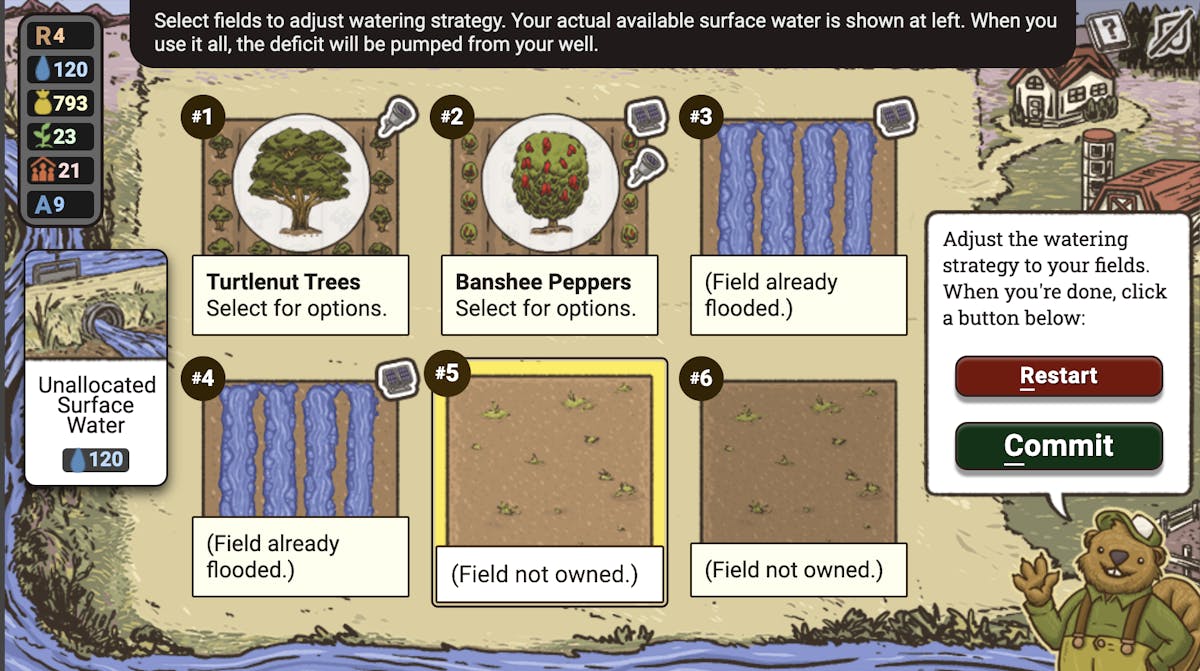 |
NMSU to host virtual certification course in Spanish for commercial canned food processors New Mexico State University’s Cooperative Extension Service in collaboration with FS Global Group will host a virtual certification course designed for operators, managers and supervisors of commercially canned acidified food processing operations. This course will be offered in Spanish and is open to canned food processing operations in the region and Latin America.
The Better Process Control School workshop will be available in two options. Acidified Foods Certification will be from 8 a.m. to 12 p.m. June 9-12. Individual registration cost is $500 plus tax, and the cooperate registration cost for three or more participants is $470 plus tax. Complete Training and Certification will be from 8 a.m. to 12 p.m. June 9-13 and June 16-17. Individual registration cost is $600 plus tax, and the cooperate registration cost for three or more participants is $550 plus tax.
The registration fees include a digital certificate of completion and related technical information. Each participant must purchase the required textbook available through the Consumer Brands Association website.
The Better Process Control School – Acidified Foods Certification option gives learners insights and education in the principles and practical application of the guidelines determined by the Food and Drug Administration. In this course, participants will learn the scientific basis of thermal processing, strategies for pathogen control, mild thermal processes and more.
The Better Process Control School – Complete Training and Certification is the most comprehensive option, which prepares learners for role changes or product introductions in any processing type. By completing this course, participants will meet the FDA regulations, which require that each processor of low-acidified and acidified low-acid canned foods operate with a certified supervisor on hand at all times during processing. This also meets similar USDA Food Safety and Inspection Service regulations for thermally processed meat and poultry.
For more information or to register, contact Luis Sabillón at lsabillo@nmsu.edu, Sutze Liu Gonzales at sliu@grupofs.com, or visit https://grupofs.com/#CursosFS or https://foodtech.nmsu.edu/workshops/bpcs.html. |
NMSU to host virtual certification course in Spanish for commercial canned food processors New Mexico State University’s Cooperative Extension Service in collaboration with FS Global Group will host a virtual certification course designed for operators, managers and supervisors of commercially canned acidified food processing operations. This course will be offered in Spanish and is open to canned food processing operations in the region and Latin America.
The Better Process Control School workshop will be available in two options. Acidified Foods Certification will be from 8 a.m. to 12 p.m. June 9-12. Individual registration cost is $500 plus tax, and the cooperate registration cost for three or more participants is $470 plus tax. Complete Training and Certification will be from 8 a.m. to 12 p.m. June 9-13 and June 16-17. Individual registration cost is $600 plus tax, and the cooperate registration cost for three or more participants is $550 plus tax.
The registration fees include a digital certificate of completion and related technical information. Each participant must purchase the required textbook available through the Consumer Brands Association website.
The Better Process Control School – Acidified Foods Certification option gives learners insights and education in the principles and practical application of the guidelines determined by the Food and Drug Administration. In this course, participants will learn the scientific basis of thermal processing, strategies for pathogen control, mild thermal processes and more.
The Better Process Control School – Complete Training and Certification is the most comprehensive option, which prepares learners for role changes or product introductions in any processing type. By completing this course, participants will meet the FDA regulations, which require that each processor of low-acidified and acidified low-acid canned foods operate with a certified supervisor on hand at all times during processing. This also meets similar USDA Food Safety and Inspection Service regulations for thermally processed meat and poultry.
For more information or to register, contact Luis Sabillón at lsabillo@nmsu.edu, Sutze Liu Gonzales at sliu@grupofs.com, or visit https://grupofs.com/#CursosFS or https://foodtech.nmsu.edu/workshops/bpcs.html. |
 |
NEW MEXICO FARM & RANCH HERITAGE MUSEUM |
NEW MEXICO FARM & RANCH HERITAGE MUSEUM |
Last week, the Doña Ana Master Gardeners, under the guidance of County Agricultural Agent Jeff Anderson, planted Yellowhorn seeds as part of a demonstration project between the College of ACES and the NM Farm & Ranch Heritage Museum. They will continue the project by planting seedlings. This initiative has the potential to enhance the educational mission of both institutions by exploring new crops that can adapt to changing environmental conditions. Appreciation is extended to the Master Gardeners and Jeff Anderson for their efforts. Continued collaboration with the College of ACES and NMSU is highly anticipated. For more information, contact Interim Executive Director of the NM Farm & Ranch Heritage Museum at steve.loring@dca.nm.gov |
Last week, the Doña Ana Master Gardeners, under the guidance of County Agricultural Agent Jeff Anderson, planted Yellowhorn seeds as part of a demonstration project between the College of ACES and the NM Farm & Ranch Heritage Museum. They will continue the project by planting seedlings. This initiative has the potential to enhance the educational mission of both institutions by exploring new crops that can adapt to changing environmental conditions. Appreciation is extended to the Master Gardeners and Jeff Anderson for their efforts. Continued collaboration with the College of ACES and NMSU is highly anticipated. For more information, contact Interim Executive Director of the NM Farm & Ranch Heritage Museum at steve.loring@dca.nm.gov |
NEW MEXICO FFA ASSOCIATION |
NEW MEXICO FFA ASSOCIATION |
SCHOOL OF HOTEL, RESTAURANT & TOURISM MANAGEMENT |
SCHOOL OF HOTEL, RESTAURANT & TOURISM MANAGEMENT |
Returning Alumni, Industry Partnership and Student Success Highlighted at Annual Hospitality and ACES Career Fair We had another amazing year at our Annual Hospitality and ACES Career Fair, held on February 20, 2025 at the Las Cruces Convention Center. This year we welcomed twenty-seven companies seeking to share career opportunities with our students. Many of the companies were represented by successful alumni from the College of ACES and HRTM that return to foster the next generation of professionals, and who maintain networking and support of NMSU. These companies entrust their businesses to former students who have invested in their education to prepare them for success in their careers. Students were excited to learn about opportunities for part time, full time, seasonal and summer internships as well as get advice from professionals as they consider their career opportunities. We received very positive feedback from the company representatives about the preparedness, professionalism and passion of our students. It is our hope to continue to grow this annual event and continue to extend invitations to the campuses from DACC, EPCC, students from the College of Business as well as all the disciplines within the College of ACES. Additional Career Services are offered and available to students of any major and alumni who would like to participate. We welcome any feedback and involvement from our campus and community partners though the Marriott Hospitality Futures Center by contacting Andrea at arrigucc@nmsu.edu or visiting us in Gerald Thomas Hall, room #119. |
Returning Alumni, Industry Partnership and Student Success Highlighted at Annual Hospitality and ACES Career Fair We had another amazing year at our Annual Hospitality and ACES Career Fair, held on February 20, 2025 at the Las Cruces Convention Center. This year we welcomed twenty-seven companies seeking to share career opportunities with our students. Many of the companies were represented by successful alumni from the College of ACES and HRTM that return to foster the next generation of professionals, and who maintain networking and support of NMSU. These companies entrust their businesses to former students who have invested in their education to prepare them for success in their careers. Students were excited to learn about opportunities for part time, full time, seasonal and summer internships as well as get advice from professionals as they consider their career opportunities. We received very positive feedback from the company representatives about the preparedness, professionalism and passion of our students. It is our hope to continue to grow this annual event and continue to extend invitations to the campuses from DACC, EPCC, students from the College of Business as well as all the disciplines within the College of ACES. Additional Career Services are offered and available to students of any major and alumni who would like to participate. We welcome any feedback and involvement from our campus and community partners though the Marriott Hospitality Futures Center by contacting Andrea at arrigucc@nmsu.edu or visiting us in Gerald Thomas Hall, room #119. |
 |
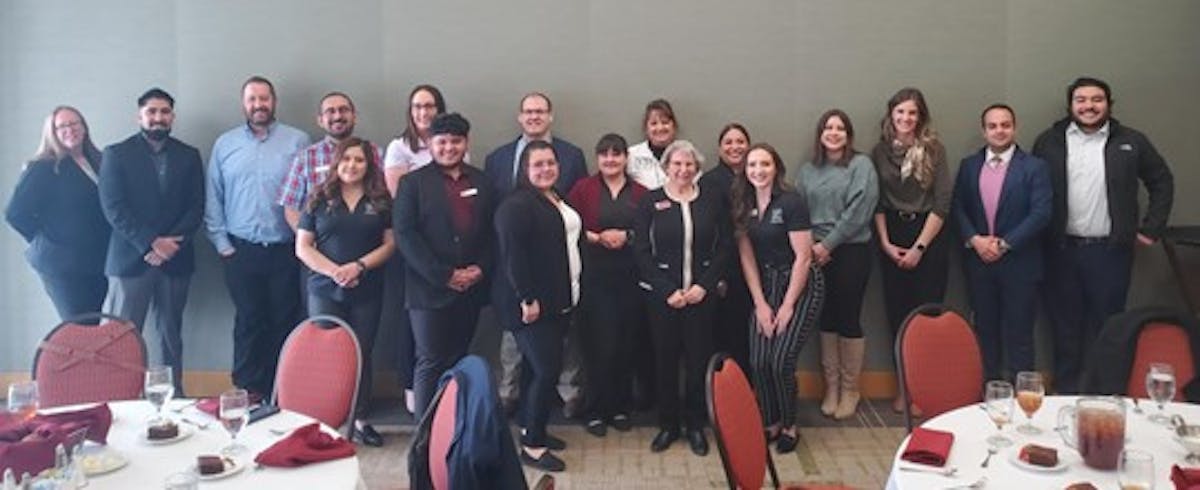 |
While numerous studies have examined the economic repercussions of drought, there remains a gap in integrated analyses comprehensively assessing its economic effects, especially where there is no drought adaptation policy under debate calling for a standard cost-benefit analysis. This work's first contribution comes from the development of a mathematical analysis predicting total New Mexico county income for several counties and years, for which population growth in some regions showed increasing water use despite the presence of drought. Using the arid southwest U.S state of New Mexico as a case study for the drought years of 2017-2019, this work develops a second innovation to assess drought damages based on comparing changes in per capita water use from 2015 to those later years. Using those two innovations, total economic damages to water users summed over the three drought years amount to $1.983 billion, just under 1% of New Mexico’s total income for that period. Overall, economic effects of drought in New Mexico were more modest than anticipated partly because water users in New Mexico state showed remarkable resilience in handling water shortages due to several unique structural features of the state's income generation processes This paper was published in the Journal Water Policy in fall of 2024 by Leila Shadabi and Dr. Frank A. Ward. A summary abstract is at https://iwaponline.com/wp/article/26/9/895/104230/Innovations-in-economic-assessment-of-drought-an. Please contact Frank A. Ward at fward@nmsu.edu for more information. |
While numerous studies have examined the economic repercussions of drought, there remains a gap in integrated analyses comprehensively assessing its economic effects, especially where there is no drought adaptation policy under debate calling for a standard cost-benefit analysis. This work's first contribution comes from the development of a mathematical analysis predicting total New Mexico county income for several counties and years, for which population growth in some regions showed increasing water use despite the presence of drought. Using the arid southwest U.S state of New Mexico as a case study for the drought years of 2017-2019, this work develops a second innovation to assess drought damages based on comparing changes in per capita water use from 2015 to those later years. Using those two innovations, total economic damages to water users summed over the three drought years amount to $1.983 billion, just under 1% of New Mexico’s total income for that period. Overall, economic effects of drought in New Mexico were more modest than anticipated partly because water users in New Mexico state showed remarkable resilience in handling water shortages due to several unique structural features of the state's income generation processes This paper was published in the Journal Water Policy in fall of 2024 by Leila Shadabi and Dr. Frank A. Ward. A summary abstract is at https://iwaponline.com/wp/article/26/9/895/104230/Innovations-in-economic-assessment-of-drought-an. Please contact Frank A. Ward at fward@nmsu.edu for more information. |
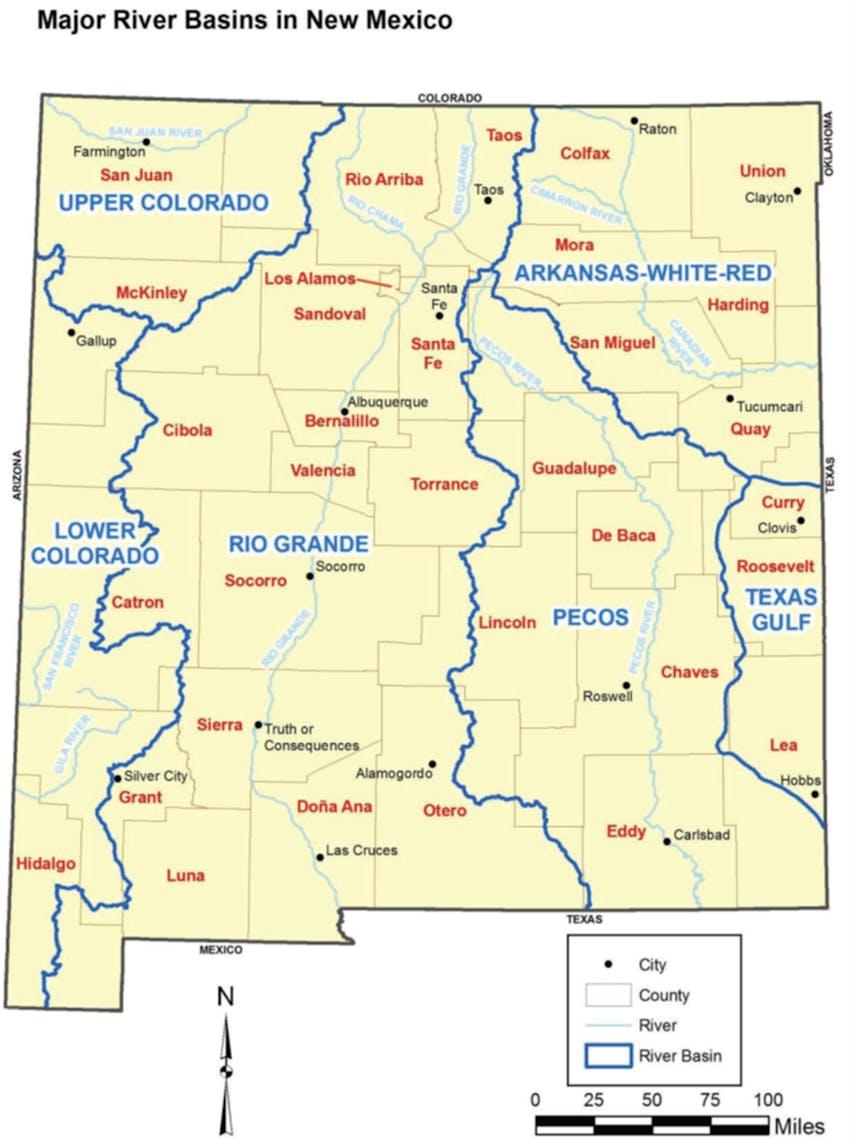 |
|
|
Toward artificial general intelligence in hydrogeological modeling with an integrated latent diffusion framework Abstract: Hydrogeological modeling is critical for water resource management and environmental protection, but their complex and variable nature makes accurate modeling challenging. Traditional approaches rely on separate models for tasks such as simulating water flow, predicting solute transport, or identifying subsurface structures, and each task requires significant time and effort for setup and adjustment. This study introduces a Latent Diffusion Model (LDM) as a new machine learning framework that efficiently performs multiple hydrogeological modeling tasks. The LDM generates detailed representations of subsurface spatial variability, efficiently predicts flow and mass transport, and directly identifies underground structures from observed data without iterative simulations. By integrating these capabilities into a single framework, the LDM streamlines workflows, reduces computational demands, and improves adaptability across diverse scenarios. This innovative approach not only enhances modeling efficiency but also lays the foundation for intelligent systems to address complex environmental challenges. Citation: Zhan, C., Dai, Z., Jiao, J. J., Soltanian, M. R., Yin, H., & Carroll, K. C. (2025). Toward artificial general intelligence in hydrogeological modeling with an integrated latent diffusion framework. Geophysical Research Letters, 52, e2024GL114298. https://doi.org/10.1029/2024GL114298 |
Toward artificial general intelligence in hydrogeological modeling with an integrated latent diffusion framework Abstract: Hydrogeological modeling is critical for water resource management and environmental protection, but their complex and variable nature makes accurate modeling challenging. Traditional approaches rely on separate models for tasks such as simulating water flow, predicting solute transport, or identifying subsurface structures, and each task requires significant time and effort for setup and adjustment. This study introduces a Latent Diffusion Model (LDM) as a new machine learning framework that efficiently performs multiple hydrogeological modeling tasks. The LDM generates detailed representations of subsurface spatial variability, efficiently predicts flow and mass transport, and directly identifies underground structures from observed data without iterative simulations. By integrating these capabilities into a single framework, the LDM streamlines workflows, reduces computational demands, and improves adaptability across diverse scenarios. This innovative approach not only enhances modeling efficiency but also lays the foundation for intelligent systems to address complex environmental challenges. Citation: Zhan, C., Dai, Z., Jiao, J. J., Soltanian, M. R., Yin, H., & Carroll, K. C. (2025). Toward artificial general intelligence in hydrogeological modeling with an integrated latent diffusion framework. Geophysical Research Letters, 52, e2024GL114298. https://doi.org/10.1029/2024GL114298 |
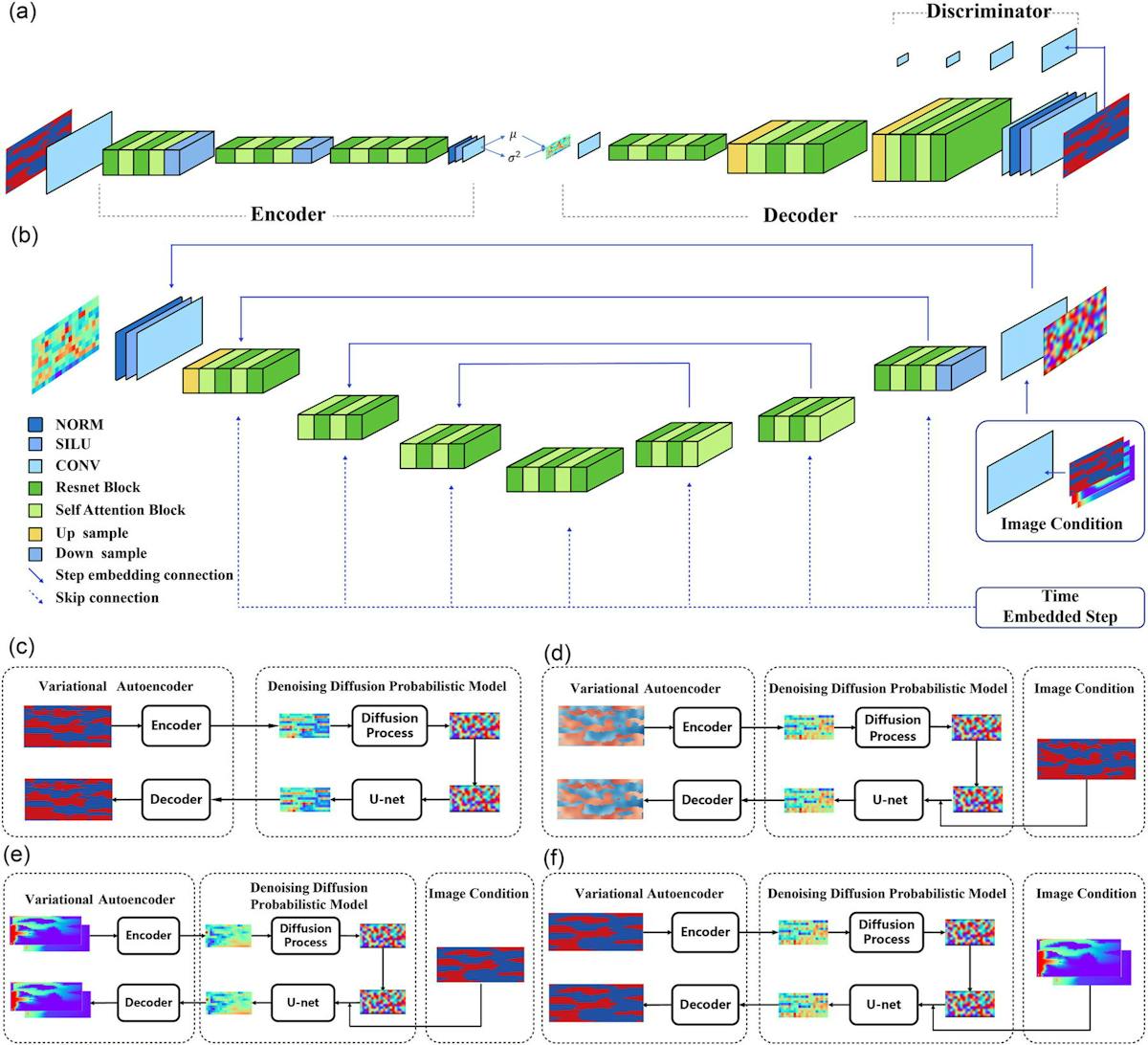 |
The Latent Diffusion Model framework and task implementation: (a) Variational Autoencoder, (b) U-Net, and schematic diagrams for (c) Single-scale heterogeneity generation, (d) Multiscale heterogeneity generation, (e) Surrogate modeling, and (f) Direct inversion. |
The Latent Diffusion Model framework and task implementation: (a) Variational Autoencoder, (b) U-Net, and schematic diagrams for (c) Single-scale heterogeneity generation, (d) Multiscale heterogeneity generation, (e) Surrogate modeling, and (f) Direct inversion. |
Click on the following link to give to the College of ACES. Give Now | New Mexico State University Foundation (nmsu.edu) You can also contact Planning Officer Erika De La O. Medina at erikadlo@nmsu.edu for more information on how to give to the College of ACES. |
Click on the following link to give to the College of ACES. Give Now | New Mexico State University Foundation (nmsu.edu) You can also contact Planning Officer Erika De La O. Medina at erikadlo@nmsu.edu for more information on how to give to the College of ACES. |
COLLEGE OF ACES MAGAZINE – FALL 2024 ISSUE |
COLLEGE OF ACES MAGAZINE – FALL 2024 ISSUE |
|
|
The College of Agriculture, Consumer and Environmental Sciences is an engine for economic and community development in New Mexico, improving the lives of New Mexicans through academic, research, and Extension programs. |
The College of Agriculture, Consumer and Environmental Sciences is an engine for economic and community development in New Mexico, improving the lives of New Mexicans through academic, research, and Extension programs. |
|
|
| |



















